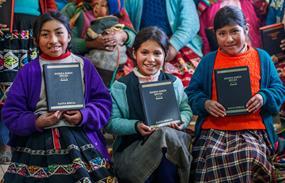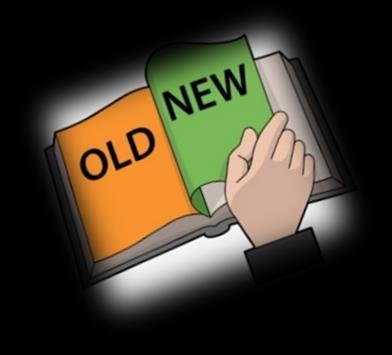March 2023

Dear Friends and Family,
One of the most encouraging things to see in Bible translation work of course is the starting of a new Bible translation project. However, we think the most exciting thing to see after the translation of the New Testament is complete is the translation of the Old Testament.



Oneof the joys Chuck hashad since starting his new work with Wycliffe in the area of missionary care is seeing the number of Bible translators he now provides care for that are working on Old Testament translations after they have finished New Testament translations. One couple is working on the books of Psalms and Proverbs and another is working on oral Bible translations after completing both the Old and the New Testament translations.
work is still being done. That takes a toll on physical and emotional health and many have had children, now married with their grandchildren who live long distances away.
These remote locations often also mean limited means of communication and having very simple housing situations with limited conveniencesinthehomeandfewopportunities formonthsatatimetointeractwithpeoplefrom their home countries. So, much of what Chuck provides are words of encouragement as well as helping them know what resources Wycliffe provides for them. One of these resources is Wycliffe’s WCARE booklet which describes how we can help.
Completed Scriptures!
As Chuck has gotten to know these Bible translators, one thing he has come to understand is that for them to complete these Bible translation projects missionary care is absolutely necessary. Some of these translators have spent 30+ and some even more than 50+ years finishing the entire Bible and that means continued trips to villages where the majority of
1 | Page
Wycliffe’s Missionary Care Booklet
Click Here WCARE
Please pray that Chuck would be effective in his Resource Coordinator work by providing missionary care for Wycliffe missionaries scattered around the world!
Edited from René van den Berg’s PNG article - 2022
Why doesittakesomeoneworkingforWycliffe Bible Translators in Papua New Guinea (PNG) on average 15 to 25 years to translate the New Testament and complete Bibles much longer? Why so long for just the New Testament?
In most versions of the Bible, the New Testament is between 300 and 400 pages. Is 2025 years not unreasonably long to translate a book of that size?

There are four parts to the answer:
1) Bible Translation Work Is A Complex Undertaking.
2) Bible Translators Have Multiple Tasks.
3) Bible Translators Have Multiple Roles.
4) Personal Factors.
This page will provide the answer to part one. If you wish to know the answers to the other parts, look at page 3 and 4.
1. Bible Translation Work Is A Complex Undertaking
The Bible is not an easy book, very different in culture and religion to many of the cultures that Bible translators work in. Many languages and cultures in Papua New Guinea were traditionally not only unfamiliar with gold and money, bread and wine (to name just a few things), but also with priests and kings, prophets and temples, and writing and books, were not part of their culture. For various biblical key words it takes long discussions to find the right equivalent in their language. Examples include finding words for sin, the Law, covenant, forgiveness, righteousness, hope, glory. All this takes time.
Each translated book of the New Testament goes through six different stages before a draft version of the book is published: starting with a first draft (usually done by local translators), then a peer check (done by other members of the translation team), then an exegetical and accuracy check (done by a translatorcertified for this task), then a village check (done by the certified translator), then a back-translation in literal English (done by the certified translator), and finally a consultant check (done by an external consultant). At each stage different people are involved. This means that each chapter and each verse needs to undergo a very thorough process of checking, editing, revising and rechecking. All this takes time much time.
Ministry Update
We wish to thank all of you who partner with us Due to faithful ministry partners who continue to give every month and a number of one-time gifts at the end of the year, we continuetobeat100%support! PraisetheLord!
We know that financial support goes up and down, so please pray for our continued 100% support!!!
FOR SUPPORTING US FINANCIALLY NOW
Wycliffe Bible Translators
P. O. Box 628200, Orlando, FL 32862-8200
Mark on separate sheet mark: “Preference for the Wycliffe ministry of Chuck & Barb Micheals, Account # 221879.”
Online Giving:
www.wycliffe.org/partner/cbmicheals
FOR PRAYER SUPPORT / OUR HOME ADDRESS
Chuck & Barb Micheals
5167 Poinsetta Ave, Winter Park, Florida 32792 (321) 278-2225 (Chuck) (321) 695-0281 (Barb)
Email: Chuck_Micheals@wycliffe.org
Barb_Micheals@wycliffe.org
Web: www.issuu.com/wycliffe-cbmicheals www.cbmicheals.ning.com
2 | Page
Answers to Part 2-4
2. Bible Translators Have Multiple Tasks
The work of a Bible translator is very different from someone who is translating a work of literature, such as Homer’s Odyssey from Greek into English, Calvin’s Institutes from Latin into Korean, or Bunyan’s Pilgrim’s Progress from EnglishintoSwahili.Inthosecases,thetranslator typically translates into a target language he has grown up speaking. The translators have studied the source language (e.g., Greek, Latin) for many years and may even speak it. They have dictionaries, grammars and spelling guides for the target language at their disposal, not to mention Google Search and Google Translate. They usually work in isolation, with maybe one or two other people checking the work once it is ready to be published. These translators can be considered“armchairtranslators,” workingfrom their desks at home.
A Bible translator, on the other hand, is a field translator, working in a target language that is not their own. In most cases the target language has neverbeenwrittendown and lacks aspelling guide, a grammar, a dictionary and printed books. Their task is therefore much more demanding and comprehensive. Though there is considerablevariationindifferentcontexts,here are a few tasks that Bible translators also usually have to do.
They have to learn to speak an unwritten language, just from interacting with people they live with, typically in rural villages. This step alone takes years. They have to do basic linguistic analysis in order to design an alphabet, discover and describe the grammar of the language, and collect words for a dictionary.
They have to find and train local translators (members of the translation team), organize and manage such a team, teach the team members translationprinciples,andhelpwithcheckingthe translation in the village. They often have to teach people to read and write in their own
language,ensuringthatthespellingisusableand acceptable. They also need to produce other easy reading booksthatcan pave theway forthe publication of God’s Word.
They have to organize Scripture Use activities, helping people to see the value and power of having God’s Word in their own language, through group readings, Bible study, Bible drama, and other activities involving the Bible.
They have to establish and maintain relationships in the community, not only with neighbors and members of the translation team, but also with pastors and church leaders (often more than one denomination), and teachers and government leaders. Relationships are vital in rural communities and critical for the acceptability of a Bible translation. Much time can go into this aspect of the work.
In short, Bible translators often undertake the broader task of language development as a necessary strategy toward making translated text usable and used by the community.
3. Bible Translators Have Multiple Roles
While they are on the field, Bible translators fulfill various other roles besides being translatorsandfieldlinguistsasdescribedabove. Here are some of these roles:
They are cross-cultural workers who are guests in a foreign culture, with all its accompanying stresses relating to housing, food, climate, health care, physical fitness, use of time and money, computers and printers, friendships and relaxation.
They are often spouses and parents, who have to maintain healthy marriages and deal with parenting issues in a cross-cultural setting, as well as sometimes home-schooling of young children.
They are missionaries sent out by their home churches,withwhomtheyneedtocommunicate
3 | Page
on a regular basis about their lives and their work.
They are members of a field organization [such as Wycliffe], which has its own structure and its requests and demands for time. This can be professionally (e.g. training to be a consultant in order to help other translation teams), organizationally (serving as part of the administration for a season, or on the Executive Committee, or the school board), or spiritually (serving on the Sunday Services committee, preaching in the Sunday service).
4. Personal Factors
Bible translators need to be well-educated, having knowledge of the Bible, biblical languages, linguistics and translation theory. In addition, they also need to be:

• Self-funded - able to build a network of partners who provide money for the translator (and family) to live and work to the completion of the translation project.
• Self-motivated - able to retain their motivation, even in trying circumstances.
• Self-managed - able to work independently without close supervision.
• Self-paced - able to set and maintain a pace of work that is sustainable.
The combination of all these factors has different effects on different people, often dependent on personalities and family situations. Some people thrive, but others struggle, finding it hard to maintain a healthy balance between work and rest. One thing is clear: keeping all these balls in the air takes a lot of time and energy. Not surprisingly, physical andemotionalburnout,aswellasfacingspiritual opposition, are all factors that many Bible translators have to deal with in their life. Thus, the need for missionary care!
Conclusion
Each New Testament or an entire Bible that gets published is a tribute to the enormous commitment and dedication of the local people and well as Wycliffe translators, literacy workers and support personnel who come along side of translators such as teachers for missionary children, finance personnel, pilots, health care workers and even those who provide HR support, do government relations and related to churches.
None of this would happen if it weren’t for a team of financial and prayer supporters who not only sent missionaries out, but also support them It is one thing to start a Bible translation project, but it takes peoplededicated to the long haul to see language communities have the whole Bible!
The more remote the location, the more difficult it is to support translation projects. What services and supplies are available locally makes a difference as does the educational level ofthegeneralpopulationinthecountry.Security on the ground also determines how often and when translators can visit certain areas.
General services in a place like Papua New Guinea are in many ways improving, but for some time to come, support of people, finances and prayer will be needed from churches around the world.
4 | Page
Pray not only for new Bible translation projects to be started, but also for existing ones to complete both the Old and New Testaments.






